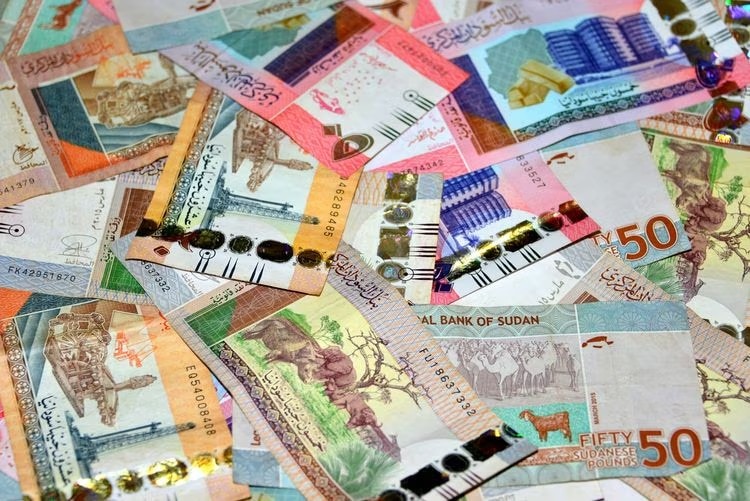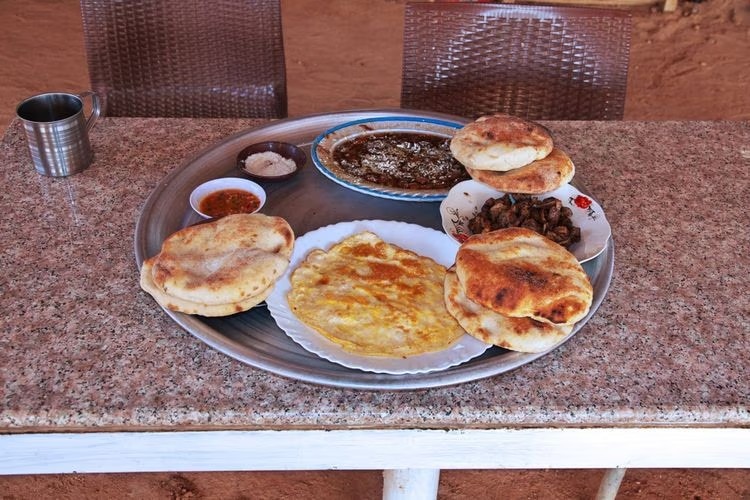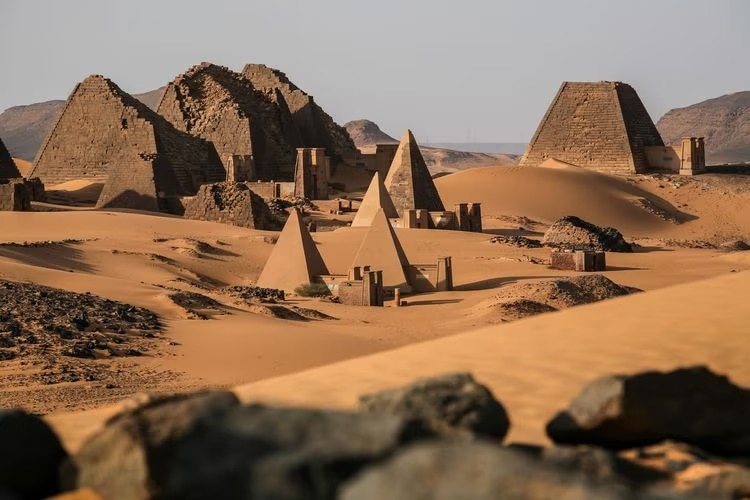Sudan Travel Tips and Information

Origin of Image source: istockphoto.com
Official Name
Republic of the Sudan
Capital
Khartoum
Population
Country Code
Approximately 50.7 million
SD
Country Code (international calls)
+249
The flight time to Sudan is approximately ---- hours. Check the climate, currency, religion, manners, other information of Sudan below. Wishing you pleasant travels to Sudan.
Sudan is located in Northern Africa and is bordered by Egypt, Eritrea, Ethiopia, South Sudan, Central African Republic, Chad, Libya and the Red Sea.
Local Climate / Weather
Sudan, located in Northeast Africa, has a predominantly desert climate, with extremely hot, arid summers and mild winters, especially in its northern regions. The country experiences high temperatures, particularly from April to September, with some areas reaching over 40°C (104°F). Rainfall is scarce in the north but increases towards the southern regions, where tropical savanna climates bring heavier seasonal rains from May to October.
Currency & Tipping
Currency
When traveling to Sudan, all visitors should familiarize themselves with the local currency and tipping customs to ensure a smooth and respectful experience. Sudan's official currency is the Sudanese Pound (SDG), often abbreviated as "ج.س" in Arabic. Travelers are encouraged to bring cash in small denominations, as credit card acceptance is limited, especially outside major cities like Khartoum. Currency exchanges are available at banks and authorized exchange bureaus; however, it’s advisable to carry some US dollars, as they are widely accepted for exchange.
Tipping
Tipping in Sudan is not obligatory, but it is appreciated as a gesture of gratitude. In restaurants, a small tip of around 5-10% is customary if a service charge is not included. For hotel staff, tipping a few pounds for assistance with luggage or room service is considered polite. Taxi drivers generally do not expect a tip, but rounding up to the nearest pound is a courteous gesture. Keeping these practices in mind will help all travelers show appreciation for services while respecting local customs.
Useful Travel Information

Voltage & Electrical Outlets
In Sudan, the standard voltage is 230V with a frequency of 50Hz, and power outlets primarily accept Type C and Type D plugs. All travelers are advised to check if their devices are compatible with these plugs and voltage. Bringing a universal travel adapter and voltage converter, if necessary, can help avoid compatibility issues and ensure device safety throughout the trip.

Internet Connectivity
Internet access in Sudan has gradually improved, with several local carriers providing mobile internet services to travelers. Prominent providers include Sudatel and MTN Sudan, which offer various prepaid packages tailored for short-term visitors. SIM cards are widely available at airports and local telecom stores, providing options for data packages that suit varying budgets and needs. For all travelers looking to stay connected, purchasing a local SIM card or arranging a portable Wi-Fi device before arrival can be convenient.
Water for Consumption (Drinking Water)
Tap water in Sudan is generally not recommended for direct consumption due to potential health risks. All travelers are advised to drink only bottled or purified water to prevent illness. Bottled water is readily available at hotels, restaurants, and supermarkets, making it convenient to access clean drinking water throughout the trip. Additionally, carrying a portable water purifier or using purification tablets can be beneficial for those planning to explore remote areas.
Culture, Religion & Social Etiquette
Culture
Sudan, a nation rich in ancient history and diverse cultural heritage, offers a unique blend of African and Arab traditions. The Sudanese are known for their hospitality, welcoming visitors with warmth and friendliness, a trait that all travelers will appreciate. Sudan’s cultural landscape is characterized by its tribal diversity, with over 500 ethnic groups, each contributing distinct customs, languages, and art forms. For example, the Nubians in the north preserve age-old architectural styles and musical traditions, while the Beja people of the eastern regions are known for their intricate, centuries-old jewelry designs and attire. Traditional celebrations in Sudan are deeply tied to Islamic practices, as Islam plays a central role in Sudanese life. Festivals such as Eid al-Fitr and Eid al-Adha are observed with communal prayers, feasting, and charity. Weddings, too, are significant cultural events marked by colorful dances, traditional music, and elaborate ceremonies, where All travelers can experience the Sudanese community spirit.
Religion
Islam is the dominant religion in Sudan, with the vast majority of the population identifying as Sunni Muslims. This religious influence is visible in daily life, from the call to prayer heard across cities to the modest dress customs practiced by both men and women. In Sudan, Islamic values shape social and cultural norms, and respect for religious practices is vital. All travelers, whether Muslim or not, will be welcomed with respect, but it’s advisable to familiarize oneself with Sudanese customs around prayer times, dress codes, and religious events. Churches do exist for the Christian minority, making Sudan a country where interfaith coexistence, though limited, can be observed.
Social Etiquette
Respectful behavior and modesty are key aspects of Sudanese etiquette. Sudanese people place high value on greetings, particularly handshakes and friendly exchanges, often inquiring about family health and well-being. All travelers should note that men and women sometimes avoid direct physical contact, especially in rural areas, to observe Islamic customs. When visiting a Sudanese home, it’s customary to remove shoes at the entrance, and bringing a small gift, such as sweets or fruits, is appreciated. Dining customs are also an important part of Sudanese manners. Meals are typically eaten with the right hand, as the left hand is considered unclean. Guests are often served tea or coffee as a welcoming gesture, and it is polite to accept. While travelers are used to family-style dining, Sudanese meals are often served in communal dishes, where sharing food symbolizes trust and friendship. Observing these customs will enhance all travelers' cultural experience in Sudan, allowing them to connect respectfully with the locals and deepen their understanding of Sudanese hospitality. By understanding Sudan’s unique blend of cultural values, religious influences, and social etiquette, all travelers can enjoy a rewarding and enriching experience in this ancient and diverse nation.
Food Culture
Sudan’s culinary landscape offers a flavorful journey that all travelers will appreciate, blending Middle Eastern and African influences in hearty, spice-rich dishes. At the heart of Sudanese cuisine are staples like kisra, a flatbread made from fermented sorghum, and aseeda, a porridge often enjoyed with spicy sauces or stews. A typical Sudanese meal is accompanied by aromatic dishes such as mullah, a tomato-based sauce infused with spices, which complements the natural flavors of vegetables or tender meats. For those eager to explore Sudanese street food, the bustling markets and streets provide a variety of quick, flavorful options. Tamia, Sudan's version of falafel, offers a delightful crunch and is typically served with a generous side of salata (salad) and local bread, perfect for a light but satisfying meal. Another popular street food is foul medames, a seasoned fava bean dish often topped with a mix of spices, chopped vegetables, and a splash of olive oil. This nutritious dish is widely enjoyed, especially for breakfast, providing a hearty start to the day. Sudan’s capital, Khartoum, is home to numerous local restaurants that all visitors can explore for an authentic dining experience. Restaurants such as Ozone Café offer a comfortable ambiance and a mix of traditional and contemporary Sudanese dishes, while Assaha Traditional Village Restaurant serves an array of local delicacies in a rustic setting that enhances the dining experience. Another must-visit is Al Nuba, known for its Sudanese specialties and warm hospitality. Experiencing Sudanese cuisine allows all travelers to dive into the culture, enjoying flavors that are distinct yet familiar, with an array of dishes that highlight the country's rich culinary heritage.
Major Tourist Attractions & UNESCO World Heritage Sites
Major Tourist Attractions
Major tourist attractions in Sudan include the Sudan National Museum, the capital Khartoum, Kassala (eastern Sudan), the ruins of Old Dongola, and Omdurman (western Sudan). At the National Museum, you can feel the history of Sudan through the exhibits of ruins, earthenware, and other artifacts. Coffee is popular in Kassala (eastern Sudan). There is a camel market in Durman (western Sudan), where many camels are sold before the Sacrificial Festival. Although it is difficult to buy a camel, just observing the precious camel market may be a lifetime memory for you.
UNESCO World Heritage Sites
There are two World Heritage Sites in Sudan. One is the Pyramids of Meroe. The pyramids of Meroe are more steeply inclined and elongated than the pyramids of Egypt. There are relatively few tourists, so you can enjoy sightseeing at your leisure. The other is the ruins of Gebel Barkal and the Napata area. Here you can see the remains of 13 temples, 3 palaces, and a cemetery.
Voice of Travelers to Sudan
The best air ticket to Sudan
The best air ticket that I booked to Sudan was in Saudi Arabia with Qatar Airways. When comparing air tickets, economy class tickets with Qatar Airways are the cheapest tickets available to Sudan. I had such a great time in Sudan. The weather and food was great. I also booked a ticket for a group tour and the excursion was a lot of fun. I will be booking a ticket to Sudan next year and hope that I can explore the country more.
Nice trip in Sudan with a cheap direct ticket
I am from Wales and purchased my ticket to Sudan. The ticket was a first-class ticket and the service was excellent. My visit to Sudan was enjoyable an I booked tickets to see some attractions once there. I travelled to Omdurman and Arkawit while in Sudan. Such great sights! I will return to Sudan and hope to book my air ticket soon.



